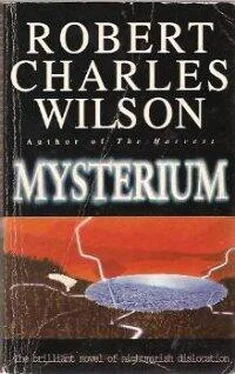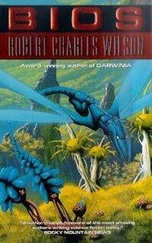The soldiers took aim as Demarch scrambled from the right-side rear door. He was wearing his Bureau uniform; even at this distance they would know him for a Proctor. Glass exploded all around him in brittle showers, and he heard the whine of bullets and their hammering impact on the snowbound roadway. When he stood to run, he felt the bullets enter his body.
Then he was on the ground. The soldiers shouted and waved their weapons, but that sound faded into noise. Breathless, Demarch turned his head to look at the burning building. The roar of it was all around him. The fire had melted the snow into mirrors of ice: mirrors full of sky, fire, ash, the world, himself.
∞
Clifford Stockton had slept a little during the night. Lukas Thibault had not.
Each had been given his own cage in the basement jail at City Hall. They were separated by a dusty space in a room that had once been the building’s archives. All the filing cabinets had been moved out and their contents burned when Delafleur took over the building. The walls were concrete. The ceiling was white acoustic tile. The floor was green linoleum, and it was as cold as winter earth. Clifford had learned to keep his feet off it; his snow boots were scant protection. He spent most of his time on the tiny hemp cloth cot the Proctors had provided.
He woke to the sound of Lukas Thibault’s cursing.
“I want my breakfast,” Luke was shouting. “Assholes! We’re starving down here!”
Brief silence, then the rhythmic banging of Luke’s fist against the bars. Clifford didn’t bother to look. He could see Luke’s cell only by forcing his head against the bars of his own cage and peering around an L-bend where the cages followed the wall. It wasn’t worth the effort.
He was grateful for the relative privacy. Clifford emptied his bladder into the crockery pot provided for the purpose, embarrassed by the sound. It was cold enough this morning that the pot steamed for a few minutes after he was finished.
He sat back down on the cot and wrapped the blanket around himself.
“Fuckers!” Luke was screeching. “Cretins! Bastards!”
Clifford waited until the soldier had lapsed back into silence. Then he said, “They aren’t here.”
Luke said, “ What?”— startled, as if he had forgotten Clifford was in the basement with him.
“They’re not here!” It was obvious. For hours after dark the building had been full of sound: legions of feet upstairs, doors opening and closing, motors roaring and then fading away beyond the high, dust-clogged windows that vented the basement. “They’re gone. They evacuated. Today must be the day.”
The day of the bomb, he didn’t need to add. That was why Luke was here: for talking about the bomb.
That was also why Clifford was here, though no one had told him so—no one had talked to him. The soldiers had just put him in this cage and gone away.
It was too late now to do anything but wait, and he told Luke so.
Thibault called him a little idiot, a criminal, a liar. “They can’t leave me here. Sons of Samael! Even the Proctors wouldn’t do that!”
But the morning ticked on and Luke lapsed into a despairing silence. Clifford knew it was past dawn by the faint light in the vent windows. That was his only clock. The shadowy fluorescent tubes overhead were the only other light—and most of those were burned out.
Clifford gazed at that patch of daylight far up at the margin of the ceiling for a time he could not calculate; it was interrupted only by the sound of Lukas Thibault’s sobbing.
Then there was another sound: gunshots, and not far away.
“Sophia Mother!” Luke cried out.
This was a new threat. Clifford was dismayed: better the bomb, Clifford thought, than a gun. He had read about Hiroshima and Nagasaki. The bomb washed everything away in a tidal wave of light. The people were gone with only their shadows left behind. He had resigned himself to dying in the bomb blast, but this gunfire was different. It worried him.
The shooting paused, crackled for a time, paused again.
Then the door marked FIRE EXIT swung open, and here was the Proctor Delafleur wide-eyed and with a pistol in his hand.
In the beginning was the ennoia, and the world was made of light.
Then Sophia, a thought of the Uncreated God, committed the sin of creation. Cast out from the primordial Nous, she fashioned base matter, the hyle, and fertilized it with her spiritual principle, the dynamis, which is both seed and image of the World of Light.
Thus the world was both created and separated from its origins; it was matter with a kernel of spirit in it, neither kenoma nor pleroma. It was incomplete, less than whole; it was asymmetric.
Here was the metaphor Stern had found so compelling. It resonated with modern cosmology: pull a linchpin from primordial symmetry and everything cascades forth: quarks, leptons, atomic nuclei, stars; eventually kittens, dung beetles, physicists.
And in all this there is embedded an unquenchable epignosis, the memory of that ancient isotropic unity of all things in the uncreated world.
Sophia, abandoned, wanders the infinite shoals of hylic matter with her terrible longing for the light. And yet—And yet… Sophia laughed.
Howard had found the phrase in Stern’s notebook, circled and underlined and crowned with question marks. Sophia laughed.
∞
Howard calculated that he had to walk a hundred yards across the parking lot of the Two Rivers Physical Research Laboratory to reach its central building, the collapsed concrete-block structure where—perhaps—Stern had died.
It was not a long distance, ordinarily. But this was no longer an ordinary place. He had passed the boundaries of the ordinary. He was inside the glow.
No snow fell here. The air was suddenly moist and warm; the neat bordered lawns near the workers’ quarters were green, though the grass had not grown since the spring. Did time pass more slowly here? If so, Howard thought, his attempt to reach Stern might be futile; the bomb would detonate between one footstep and the next.
But he could see the snow falling only a few paces behind him, and it was falling at its usual pace. So time didn’t pass especially slowly here, though he supposed it might pass differently… and he took another step forward.
His vision was obscured. The eye didn’t like this environment. Nor did the other senses; he felt dizzy, awkward, alternately too hot and too cold. Most confusing, though, was this refusal of any solid object to hold still and be seen. Images curved and lost proportion as if the act of seeing them challenged their reality.
Observation, Howard thought, was a kind of quantum guillotine: it sliced uncertainty into this or that, particle or wave. Here there seemed to be no such effect. The collapsing wavefront, the moment of isness, was imprecise, too fluid, as if he were experiencing time a fraction of a second before anything happened. For instance, this asphalt under his feet. Glimpsed briefly, it was the lab parking lot, spaces marked with whitewashed numbers, 26, 27. Stare too long and it became granite or glass or grains of crystalline sand. And the temptation to stare was immense.
He understood why the firefighters had beat such a hasty retreat: too much exposure to this would surely affect more than the senses. Madness must look like this, Howard thought.
But he took another step and another after that.
The light around him was bright but sourceless. It wasn’t daylight. It pervaded everything; everything was lit up from within. Colors were divided, split as if by a prism into countless bands. Every motion was a blur.
Читать дальше












